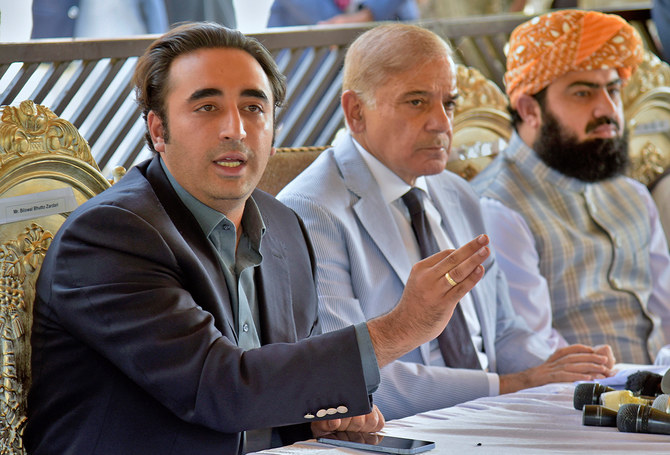ISLAMABAD: A top Pakistani opposition leader on Monday called on the country’s powerful military to clarify if the National Security Committee (NSC) had labeled opposition lawmakers “traitors” at a meeting last week to discuss an alleged conspiracy by the United States to oust Prime Minister Imran Khan from power in connivance with his political opponents.
In recent weeks, Khan has alleged that a no-confidence motion filed against him by the opposition was part of a foreign conspiracy, alleging that he had a “threatening” letter to prove his allegations.
Khan initially did not specify which country or personality had written the letter but it has since been revealed that the letter was written by Pakistan’s then ambassador to Washington, Asad Majeed Khan, after a meeting with US Under Secretary Donald Lu. Khan alleges the ambassador carried a “threatening” message from Lu, including that Pakistan’s ties with the US would decline further unless there was regime change in Islamabad.
The prime minister has accused nearly 200 opposition lawmakers of being in on the so-called conspiracy. On Sunday, the deputy speaker of the National Assembly, who belongs to Khan’s party, refused to allow scheduled voting on the no-confidence motion in light of it being orchestrated by a foreign power, and dismissed it on the grounds it was unconstitutional.
On the PM’s advice, the president subsequently dissolved the National Assembly and the federal cabinet.
Last week, the NSC, which is headed by the PM and includes the three services chiefs, also met to discuss the alleged “foreign conspiracy.” The US has denied any involvement.
“Ex-PM Imran Khan is using ‘foreign conspiracy’ to justify his coup,” Pakistan People’s Party chairman Bilawal Bhutto-Zardaro said on Twitter, calling on the army to clarify if the “NSC meeting declared the 197 members of NA [Nataional Assembly] traitors and part of a foreign plot.”
“Can foreign office or defense ministry produce any official correspondence between [March] 7-27 on foreign conspiracy?”
The Pakistan army has not yet responded to Bhutto-Zardari's demand.
A statement issued after the March 31 meeting of the NSC discussed the “communication of a senior official of a foreign country” with Pakistan’s the US ambassador.
“The Committee expressed grave concern at the communication, terming the language used by the foreign official as undiplomatic,” the statement said. “The Committee concluded that the communication amounted to blatant interference in the internal affairs of Pakistan by the country in question, which was unacceptable under any circumstances.”
Pakistan subsequently sent a demarche to the United States.
The Pakistani military has not specifically commented on the “threatening” letter or the foreign conspiracy, but on Sunday, the Inter-Services Public Relations (ISPR), the media wing of the Pakistani army, distanced itself from Sunday’s political developments.
“Whatever happened today, the institution has nothing to do with it,” DG ISPR Maj Gen Babar Iftikhar, told media in response to a question.
“There is no involvement of the institution in these developments and there is no connection.”
To a question on whether the military’s consent or advice was sought before taking Sunday’s decisions, the ISPR DG said: “Absolutely not.”
















